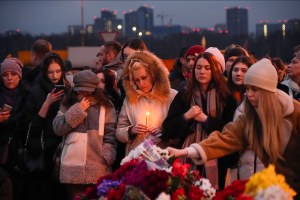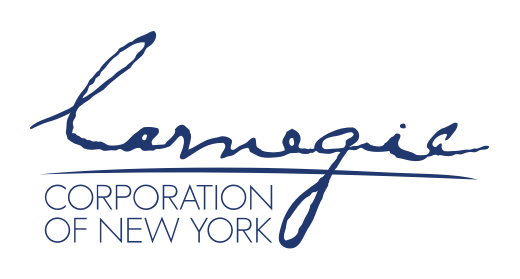Before the Crocus City Hall attack, a plurality of Russian young adults said Russia’s top foreign policy priority should be bolstering the country’s physical defenses.
In his electoral victory speech last month, Russian President Vladimir Putin committed to strengthening Russia’s defense capacity, especially in the context of its war with Ukraine. However, the recent terrorist attack on a concert venue bordering Moscow has emphasized the importance of bolstering the country’s counterterrorism efforts. The attack, for which the Islamic State claimed responsibility, killed 145 people, wounded another 551 people, and marks the deadliest act of terrorism on Russian soil in more than a decade.
Fielded on February 6–26, 2024—just a month prior to the attack—a joint survey by the Chicago Council on Global Affairs and the Levada Center finds that Russians between the ages of 18–34 consider international terrorism to be the most dangerous threat to Russia’s national interests, even more so than the war in Ukraine. In addition, a plurality of young adults say protecting the country from direct military threats should be a top foreign policy priority.
Key Findings
- Seven in 10 young Russians consider international terrorism to be a very dangerous threat to Russia’s national interests (69%)—more than the percentage of those who say the same about the war in Ukraine (50%).
- A plurality of Russian young adults say protecting the country from direct military threats should take precedence in the making of Russian foreign policy (36%).
- According to this poll and a separate February 2024 Levada Center survey of the Russian population, Russian young adults are significantly less likely than their elders to say they personally support the Russian military operation in Ukraine (65%, vs. 83% among Russians older than 45).
- Yet five in 10 young Russians think military spending on the war in Ukraine is just right (51%), while 25 percent think it is too much and 13 percent think it is not enough.
- Young Russians express more favorable views of the United States, the European Union, and Ukraine than their elders, and a majority (72%) say Russia should improve its relations with the United States and other Western nations.
International Terrorism and Ukraine War Seen as Most Critical Threats to Russia
The devastating terrorist attack in Moscow confirms the fear of terrorism that young Russians expressed just a month prior in the Chicago Council on Global Affairs-Levada Center survey. The February 2024 poll found seven in 10 Russian young adults say international terrorism poses a very dangerous threat to Russia’s national interests in the next 10 years (69%)—more than the number of those who say the same about the war in Ukraine (50%).
Heightened concerns about terrorism among young Russians may certainly be related to the war in Ukraine and Ukraine’s recent string of long-range drone attacks and railway diversions in Russia, in particular. However, Russian young adults may also be expressing separate concerns about terrorist activity by other groups, like the Islamic State, who have long resented the Soviet invasion of Afghanistan and Putin’s support for Bashar Al-Assad in the Syrian civil war. Although the Islamic State claimed responsibility for the recent attack on Moscow’s border, Russian state media continues to place blame on Ukraine.
Though to a lower degree than terrorism and the conflict in Ukraine, a sizable percentage of Russian youths also find cyber-attacks on Russian computer networks to be a very dangerous threat to Russian national interests (41%). Roughly a third of young Russians perceive climate change (35%) and both North Korea and Iran’s nuclear programs (32% each) to be dangerous threats. While Putin has pointed to the protection of Russian speakers in Ukraine as a major motivation for the conflict with Kyiv, few Russian youth see the situation for Russian speakers abroad as a critical threat to Russia (12%).
Despite these concerns about foreign policy threats, a plurality of Russian youth say they are personally more concerned about internal threats (43%) than threats outside of Russia (27%). A quarter of young Russians say they are concerned about both threats equally (26%).
Young Russians Emphasize the Importance of Territorial Security
Putin’s reelection speech also touched on the prospect of a full-scale military conflict between Moscow and NATO, and characterized the goal of Western nations as containing Russian development. Wars and invasions have been a frequent fixture in Russia’s long history, one that helps shape Putin’s concern about external threats to both Russian territorial integrity and national identity. Young Russians seem to agree with the president’s focus on territorial security, and especially in the context of their heightened fear of terrorism and the war in Ukraine.
When asked what priority should take precedence in the making of Russian foreign policy, a plurality of young Russians say the physical defense of the country (36%). However, other aspects of Putin’s worldview, such as constraining potential aggressors in the world (10%) or protecting multipolarity (8%) are seen as less important to young adults. By contrast, economic gains in global trade (20%) and international cooperation on global problems (17%) are slightly more important to them.
Half of Russian Youths Say Military Spending on War in Ukraine Is Just Right
Previous surveys by the Chicago Council on Global Affairs and the Levada Center find that young Russians are generally less supportive of the Russian military operation in Ukraine than their parents and grandparents. A February 2024 Levada Center survey of the general Russian public found that Russian young adults are less likely to say they personally support the Russian military operation in Ukraine (65%) or see it as successful (67%) than older Russians (83% support and 72% successful, among Russians older than 45) (see Appendix Tables 1 and 2). They are also more likely to say that Russia should start peace talks (67%) than their elders (44%), who are more likely to support continuing the military action (see Appendix Table 3). However, young Russians are also less likely to follow news about the war in Ukraine than older Russians, which may contribute to their declining support for the conflict (see Appendix Table 4). The data additionally show that 22 percent of these young Russians report that a relative or friend has emigrated to another country because of the situation in Ukraine.
The Russian government recently announced a proposed budget for 2024 that allocates $140 billion, or 7 percent of the country’s gross domestic product (GDP), to military spending. The war against Ukraine is not only the Kremlin’s biggest priority but one of the main drivers of economic growth in Russia; as such, defense spending will exceed social spending for the first time in Russia’s modern history.
About half of young Russians think the government is spending the right amount of money on the conflict in Ukraine (51%). Conversely, a fourth of Russian youth say the country is spending too much (25%), while 13 percent say it is not spending enough. When asked about the general costs associated with Russia’s global involvement, young Russians are closely divided on whether the cost of maintaining Russia’s role in the world outweighs the benefits (39%) or whether the benefits outweigh the costs (44%; 17% say it is difficult to answer).
Seven in 10 Young Russians Think Russia and the West Should Mend Relations
Putin frequently uses anti-Western rhetoric in his speeches and public appeals to unite the Russian population against Western encroachment and position the president as a defender of Russian sovereignty. While these anti-Western sentiments are shared among older Russians, young adults less susceptible to these messages and think Russia needs to improve its relations with Western countries.
In an October 2023 survey by the Levada Center, Russians between the ages of 18–34 were found to have more favorable views of the United States, the EU, and even Ukraine than their elders (see Appendix Tables 5-7). Levada Center surveys also show that the overall Russian population has grown less likely to say that Russia needs to improve its relations with the West, while young Russians have grown more likely to support improving those relations. In May 2023, the Levada Center found that 61 percent of Russian young adults said Russia definitely (20%) or probably (41%) needs to improve its Western relations—a rate higher than that recorded among the overall population (57%, 20% definitely and 37% probably). In February 2024, the percentage of young adults that say Russia should improve its relations with the West rose to 72 percent (29% definitely and 43% probably). At the same time however, the data show that deteriorating relations with the West are lower on the list of young Russians’ concerns, as only a quarter see such as a very dangerous threat to Russian national interests (24%).
Conclusion
Young Russians presciently had their eyes on international terrorism as a higher potential threat to Russian security than the war in Ukraine, and the recent attack has likely only confirmed these fears. On the conflict with Ukraine itself, Russian youth are less enthusiastic about the military operation than older Russians but seem satisfied enough with continued funding for the war. Moreover, as a previous Council-Levada Center report showed, young Russians are unlikely to register any opposition through any type of demonstrative public action against the government.
Table 1
Do you personally support or not support the actions of the Russian armed forces in Ukraine?
| Total | Ages 18-34 | Ages 35-44 | Ages 45-54 | Ages 55-64 | Ages 65+ | |
|---|---|---|---|---|---|---|
| Strongly support | 46% | 31% | 43% | 53% | 49% | 64% |
| Somewhat support | 30% | 34% | 33% | 31% | 28% | 23% |
| Somewhat oppose | 9% | 15% | 9% | 4% | 8% | 4% |
| Strongly oppose | 7% | 11% | 5% | 7% | 8% | 4% |
| Haven't heard anything about it | 8% | 10% | 10% | 6% | 8% | 4% |
Table 2
In your opinion, how successful or unsuccessful is the “SMO” in Ukraine?
| Total | Ages 18-34 | Ages 35-44 | Ages 45-54 | Ages 55-64 | Ages 65+ | |
|---|---|---|---|---|---|---|
| Very successful | 18% | 15% | 19% | 19% | 16% | 22% |
| Somewhat successful | 52% | 52% | 50% | 54% | 50% | 55% |
| Somewhat unsuccessful | 10% | 10% | 11% | 10% | 11% | 7% |
| Very unsuccessful | 5% | 7% | 3% | 4% | 5% | 5% |
| Difficult to answer | 15% | 16% | 16% | 13% | 18% | 11% |
Table 3
In your opinion, should Russia continue military action now or start peace talks?
| Total | Ages 18-34 | Ages 35-44 | Ages 45-54 | Ages 55-64 | Ages 65+ | |
|---|---|---|---|---|---|---|
| Definitely continue military action | 26% | 13% | 22% | 33% | 31% | 40% |
| More likely to continue hostilities | 13% | 10% | 15% | 12% | 16% | 13% |
| More likely to start peace talks | 29% | 38% | 31% | 30% | 21% | 23% |
| Definitely start peace talks | 23% | 29% | 23% | 19% | 22% | 17% |
| Difficult to answer | 9% | 10% | 9% | 6% | 10% | 7% |
Table 4
Do you follow the news about Ukraine?
| Total | Ages 18-34 | Ages 35-44 | Ages 45-54 | Ages 55-64 | Ages 65+ | |
|---|---|---|---|---|---|---|
| Very carefully | 26% | 13% | 22% | 33% | 31% | 40% |
| Quite attentive | 13% | 10% | 15% | 12% | 16% | 13% |
| No special attention | 29% | 38% | 31% | 30% | 21% | 23% |
| No attention at all | 23% | 29% | 23% | 19% | 22% | 17% |
| Haven't heard anything about it | 9% | 10% | 9% | 6% | 10% | 7% |
Table 5
What is your attitude to the US now?
| Total | Ages 18-34 | Ages 35-44 | Ages 45-54 | Ages 55-64 | Ages 65+ | |
|---|---|---|---|---|---|---|
| Very favorable | 2% | 3% | 2% | 1% | 1% | 0% |
| Somewhat favorable | 14% | 28% | 13% | 10% | 9% | 5% |
| Somewhat unfavorable | 25% | 23% | 27% | 27% | 25% | 22% |
| Very unfavorable | 44% | 29% | 40% | 42% | 50% | 63% |
| Difficult to answer | 16% | 18% | 18% | 19% | 14% | 10% |
Table 6
What is your attitude to the EU now?
| Total | Ages 18-34 | Ages 35-44 | Ages 45-54 | Ages 55-64 | Ages 65+ | |
|---|---|---|---|---|---|---|
| Very favorable | 2% | 4% | 2% | 2% | 2% | 0% |
| Somewhat favorable | 15% | 28% | 15% | 10% | 10% | 6% |
| Somewhat unfavorable | 26% | 23% | 30% | 31% | 25% | 24% |
| Very unfavorable | 38% | 23% | 36% | 37% | 46% | 52% |
| Difficult to answer | 19% | 21% | 17% | 20% | 17% | 18% |
Table 7
What is your attitude to Ukraine now?
| Total | Ages 18-34 | Ages 35-44 | Ages 45-54 | Ages 55-64 | Ages 65+ | |
|---|---|---|---|---|---|---|
| Very favorable | 2% | 2% | 2% | 3% | 1% | 2% |
| Somewhat favorable | 15% | 19% | 16% | 14% | 15% | 11% |
| Somewhat unfavorable | 23% | 27% | 25% | 18% | 20% | 21% |
| Very unfavorable | 44% | 33% | 39% | 46% | 49% | 54% |
| Difficult to answer | 17% | 18% | 18% | 18% | 15% | 13% |
This Chicago Council on Global Affairs-Levada Center survey was conducted between February 6–26, 2024 among a weighted national sample of 1,003 adults between the ages of 18–34 living in Russia. This sample was obtained from a randomly generated sample of mobile phone numbers, which were used to contact respondents and survey them via a computer-assisted telephone interviewing method. The margin of error for the full sample is ± 3.1 percentage points at a 95% confidence interval.
The eligibility of respondents was verified based on their answers to questions about age and their region of residence. For the study, respondents residing within the territory of Russia between the ages of 18–34 years old were considered eligible to be surveyed.
This work is made possible by the generous support of the Carnegie Corporation of New York.








Related Content
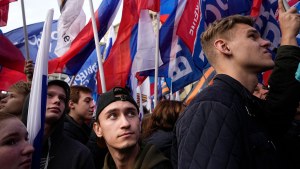 Public Opinion
Public Opinion
Although a plurality of young Russians say they are anxious about Russia’s political future, few vote or participate politically.
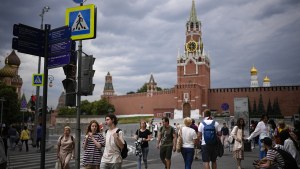 Public Opinion
Public Opinion
Russians report limited impact of Western-imposed sanctions and continued support for the war in Ukraine.
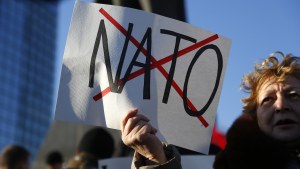 Public Opinion
Public Opinion
The Russian public is concerned about NATO expansion but does not think an attack from the West is imminent.
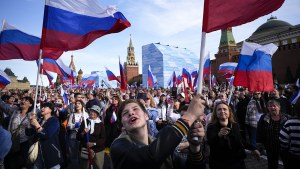 Public Opinion
Public Opinion
While many Russians favor negotiating for peace with Kyiv, they are unwilling to give up any Ukrainian territory seized since 2014. They are, however, more open to a “neutral” status for eastern Ukraine.
